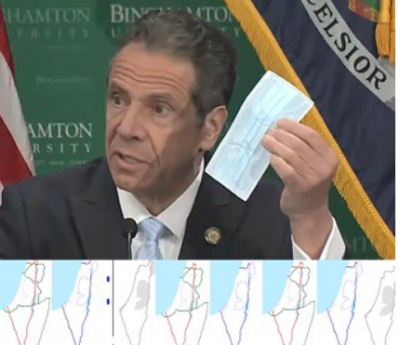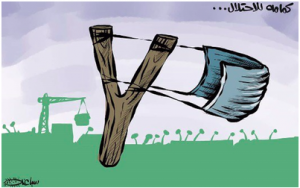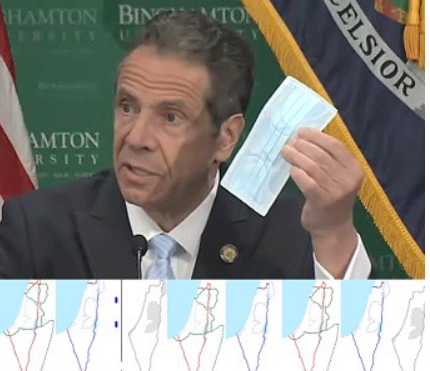The “Zionist Virus” and the Future of Palestine
New York Governor Cuomo, the Virus, the Nakba and Me

To me, an American-Palestinian, the world tainted by the corona virus is analogous to Israel tainted by the evil it contains.
Every day for the past few days, I have been listening to New York Governor Cuomo give his daily briefing on the virus. His words resonate with me eerily transforming themselves to advice on how to handle Israel’s cruel manifestation in Palestine as a Zionist Jewish apartheid colonial state. As talk of “re-opening” the New York increases in volume, so does my feverish imagination.
For those who don’t know, the Arabic word “Fateh” [فتح], the name of the Palestinian National Liberation Movement, which is the political bloc now dominating the Palestinian Authority in the occupied West Bank, means “opening”. It also carries the meaning of “conquering”. What’s more, “Fateh” and “key” [مفتاح], that profoundly indicative word of Palestinian longing for return, have the same linguistic root in Arabic. Hence, all these unbidden associations in my mind as I listen to Cuomo.
Every day, I wait for Cuomo’s briefing impatiently and watch while perched, tense and hyper-alert, at the edge of my seat, mesmerized by the shifting lines of his charts that, I swear, often morph into the outline of the map of Palestine.
My mind automatically sucks in Cuomo’s words and echoes them back at the TV in an altered form. I am Muslim, but the dynamic gripping me is one akin to the relationship between a pastor and his congregation at a black church. Cuomo calls and I respond, sometimes aloud. I hold back from hollering and shouting at his image, so as not to scare my family.
I take in every word of his sane, hopeful message — facts, not “facts on the ground”; science, not myths; let’s learn from our mistakes. Yes!
I translate his sentences into something else, like this: After decades of land theft, when will Palestinians be finally in control of their destiny and not subject to the whims of Israel and the international community? You tell me how Israel behaves today; I will tell you how Palestinians will be resisting a year from now.
The Zionist virus that is the Jewish state of Israel has yet to be stamped out. Hot-spot outbreaks have been with us since the Nakba of 1948. Currently, they are in the form of Israel’s horrifying annexation of parts of the West Bank, preying on the most vulnerable of peoples. We need to look for solutions that make things better for the Palestinian people. We need to reimagine the status quo and pose such a solution.
“In the first phase, we had to figure out what we are dealing with because we had no idea.” Yes, we had no idea — just intimations of unbelievable cruelty and diabolical greed! In 1947–48, we really had little idea. Remember, Palestine was 80% agrarian then — not the sophisticated community of Basle, Switzerland, where the plot for our dispossession was hatched at the First Zionist Conference in 1897.
“In the first phase, stabilize, control the damage,” says Cuomo. It turns out the key (here is that word again!) is information.
“I worked hard every day to make sure they knew the facts. ‘Trust the people’ — Lincoln, right? An informed public will keep this country safe. True, and that’s exactly what happened here,” Cuomo continues.
Funny Cuomo should say that, because, just the other day, a Palestinian friend on Facebook, Imad Jibawi, was saying something similar. He was commenting on a Zoom discussion I had posted titled “What do we do now?” conducted by Hani al-Masri, Director General of Masarat — The Palestinian Center for Policy Research & Strategic Studies (Masri is also a Policy Advisor for Al-Shabaka).
Imad Jibawi wondered:
“What is it that would drive the Palestinian people to the streets to protest by the thousands? Is it the annexation of Jerusalem? No; is it annexation of the Jordan Valley? No; is it Israel’s new settlements, then? No.
Why is that so?
I think the answer is in the question: Who is it mainly that we expect to take to the streets? They are those who are primarily under 30 — i.e., the Oslo generation.
These Palestinians were born and brought up in the reality of the Palestinian Authority, a government, ministries, VIPs, jobs, loans, etc.
[Preserving that] has been the national project for which our people sacrificed for years. People’s very livelihoods are now the red lines, holding them back. Their concerns are the teachers’ movement, the social security movement, the “we want to live” movement.
The question that concerns the political class as a whole is this: What next? What to do? The answer is: We start with our ABCs all over again. The first lesson is: Who are the Palestinians? What are the borders of the homeland of Palestine? The second lesson is: Who is our enemy? And what do we want?
Wanted: a new national awareness ….” [my translation from Arabic]
But then, as I continued to listen to Cuomo, I realized that, even though he and Jibawi are appealing to people to act collectively in their best interests by looking to themselves, rather than to their governments, there is a fundamental difference.
Cuomo is invoking security of health, family and livelihood as a raison d’etre for a certain set of collective behaviors, whereas what Jibawi is pushing for, necessarily given the Palestinian condition, is a revolutionary national consciousness that calls for a sacrifice of the very same things Cuomo is protecting for New Yorkers.
To Jibawi, the ideal of home and hearth (job security, health care, education, etc., as provided currently by the Palestinian Authority and the Oslo regime) must be superseded by the ideal of liberty, justice and equality for a people under occupation, who have escaped Israel’s genocide so far, but who continue to be dispossessed, brutally subjugated and oppressed by a vicious, powerful judeo-fascist entity and its allies.
Cuomo says,
“I don’t know when government became so political. It all became about rhetoric rather than actual competence, but it happened somewhere along the way that government could not handle the situation. People had to get engaged; people had to be informed and that’s the new thing I did. They got engaged because it mattered — this is not an abstract issue we are talking about people’s lives and people’s health and the health of their children.”
They’ll get engaged, because it matters. For both Palestinians and New Yorkers, these are not abstract issues. Far from it. In our case, all you have to do to realize the concreteness is to tune in to the daily news of thievery and savagery in their myriad forms the Israeli regime inflicts on the Palestinian people.
Many ask, if not the Palestinian Authority, if not the status quo of self-government for the Palestinians in the West Bank and Gaza, what then? My answer is this: First, hard as it is for many, we must find the will and steadfastness to effect an insurrection to continue the interrupted Palestinian revolution, returning to the political and community structures that sprang up to further the first intifada. We need a supreme manifestation of popular resistance against both the Palestinian Authority and Israel in all of occupied Palestine from the river to the sea with aid from Palestinians in exile.
Cuomo is right! “No government can impose any of these things … Stay in the house. Close every school. Close every bus. State government can’t enforce that. People had to understand the facts people had to engage in governing themselves in a way they hadn’t in decades … We are tough, smart, united, disciplined and loving” — even if our governments aren’t. We are samidoun.
Amen to that! Hallelujah!
*
Note to readers: please click the share buttons above or below. Forward this article to your email lists. Crosspost on your blog site, internet forums. etc.
Rima Najjar is a Palestinian whose father’s side of the family comes from the forcibly depopulated village of Lifta on the western outskirts of Jerusalem. She is an activist, researcher and retired professor of English literature, Al-Quds University, occupied West Bank.
All images in this article are from the author



